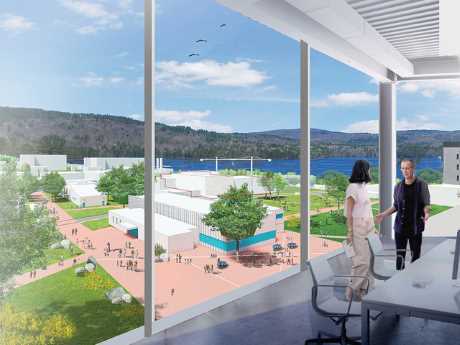Canadian Nuclear Laboratories (CNL) has begun dialogue with potential participants after unveiling its vision for the organisation's future. The long-term strategy foresees infrastructure investments of more than CAD1.2 billion ($873 million) over ten years and includes the development of a new small modular reactor (SMR) at Chalk River by 2026.
 |
| CNL's vision for Chalk River (Image: CNL) |
CNL's Long Term Strategy, released in late April, addresses the future of Chalk River Laboratories in Ontario after the National Research Universal (NRU) reactor - one of the largest and most versatile high-flux research reactors in the world, and an important supplier of medical isotopes - closes down on 31 March 2018 after 60 years of operations.
CNL will combine federal and commercial priorities and needs into four application-driven research and technology development programs: energy, including work on life extension of existing reactors, fabrication of advanced nuclear fuel, the deployment of SMRs and decarbonisation of the transport sector; health, including radiobiology research and targeted alpha therapy; safety and security, including nuclear cyber security and nuclear forensics and response; and environment, including environmental stewardship and radioactive waste management.
Over the next ten years, the Chalk River site will be "strategically consolidated and modernised" to support the nuclear research needs of the Canadian government and the science and technology needs of the Canadian and global nuclear industry. Over CAD1.2 billion will be invested in infrastructure and facilities, enabling the construction of an Advanced Nuclear Materials Research Centre complex, with new shielded facilities advanced active laboratories for research involving active or irradiated materials. A new electrical switchyard, expanded natural gas service, potable water lines, and sanitary sewer system will improve the safety and reliability of the current systems; and modern, energy efficient facilities will be constructed to accommodate maintenance and operations activities, logistics and security, as well as a new business centre.
The strategy's science and technology goals include the siting of a new SMR by 2026; development and demonstration of a suite of targeted alpha therapy compounds by 2022; the expansion of CNL's hydrogen program, aiming to play a leading role in the demonstration of hydrogen-based bulk transport by 2020; the demonstration of a new advanced fuel fabrication concept by 2020; and the development, commercialisation and deployment of a nuclear industrial control cyber intrusion detection and mitigation system by 2022.
SMR goal
CNL aims to demonstrate the commercial viability of SMR technology by 2026 "with a view to positioning Canada to take a leadership role in this emerging nuclear technology with CNL recognised globally as a leader in SMR prototype testing and science and technology (S&T) support".
According to the strategy document, CNL's long-term vision is to be a recognised hub for SMRs, where multiple vendor-supported prototypes are built and tested. "As part of this long-term vision, CNL's goal in the next ten years is to host a prototype SMR," it says.
Costs could be of the order of CDN600 million, with expected contributions from commercial entities, and executed through extensive partnering with technology vendors and end users, although the budget estimate will be refined over time through a non-binding call for expressions of interest. With an SMR sited at CNL, funding would be expected to increase as demand for CNL's S&T support from SMR vendors grows.
CNL president and CEO Mark Lesinski said the strategy was developed with input from global leaders in nuclear science, Atomic Energy of Canada Limited, CNL's current customers and others in the nuclear supply chain, local communities and stakeholders, and from CNL staff.
"The Long Term Strategy identifies those areas where CNL is uniquely equipped, and applies these strengths against what the world needs in nuclear, building on our legacy as a global leader in nuclear science," he said. "The strategy is a forward-looking document, and includes many projects that are subject to rigorous licencing and regulatory processes."
CNL's Industry Day, held on 9 May, provided interested companies and potential contractors with a first opportunity to hear more about CNL's plans.
"Significant change is occurring at CNL and this is just the beginning," Ted Preisig, CNL's vice president of capital projects, said. "Today we present our ideas on how the Chalk River skyline will change with the renewal of the laboratories' infrastructure and gain feedback on how others can help us make this vision a reality … We are starting discussions today that will shape the site for years to come."
Researched and written
by World Nuclear News














